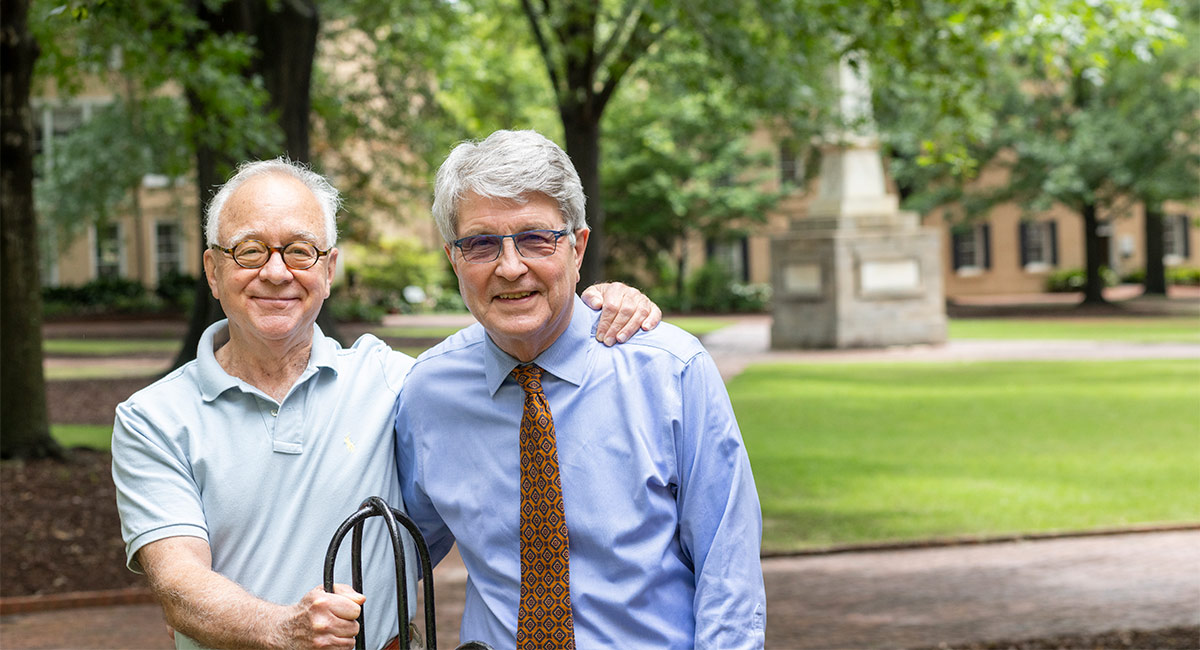
The roots of Adm. Jacob Shuford’s 35-year U.S. Navy career — which took him to top postings all over the world — were planted and nurtured in the honors program at the University of South Carolina.
That career included stints as the president of the U.S. Naval War College, where each year he led the education of 2,000 top military leaders from all over the world. He commanded the Abraham Lincoln Aircraft Carrier Strike Group — responsible for 8,000 men and women working in a high-risk environment — and was the assistant commander for Navy personnel, in charge of assignments and career development for 380,000 officers and sailors.
He even played a key role in crafting policy recommendations that dramatically reshaped the nation’s approach to global naval relationships.
Shuford says his career path was paved by the interdisciplinary education he received in USC’s honors program.
It was there, in 1970, where the Bishopville, South Carolina, native opened the door to find his new roommate Steve Lynn, now dean of the South Carolina Honors College, hanging a poster of James Taylor on their dorm room wall.
And while his career allowed him to travel the world, he has stayed connected to the relationships he forged in college and his USC degree in Arts and Letters.
“At its fundamental level, education should give us a broader frame of reference and a perspective to help make sense of the blizzard of current events and experiences that are coming at you nonstop,” Shuford says. “That kind of education has little to do with any particular discipline. In my mind, you don’t come to a university with the intent to gain a specific set of tools to do a specific job, but rather to explore the horizon, to inspire … to figure out where to take the next step.”

An interdisciplinary education
Shuford grew up in a military family and says his father wanted him to attend the U.S. Naval Academy, but the only school he really considered was the University of South Carolina, where he participated in ROTC. A lifelong Gamecock fan, he spent some time as a freelance writer covering sports for his hometown newspaper and came to USC intent on studying journalism.
But that changed after sitting in classrooms with some of the university’s top scholars and professors.
At USC, Shuford and his roommate Lynn were part of what was called the honors program — the first steps toward what would become the South Carolina Honors College, which now ranks among the nation’s best public honors colleges.
Shuford found himself drawn to an interdisciplinary education — taking a broad range of courses and majoring in what at the time was called arts and letters.
“That interdisciplinary piece is something that had an impact on my career,” he says. “I mean, I certainly would have developed along a completely different intellectual trajectory were it not for the honors program.”
It was that lifelong interest in learning that led to Shuford to later earn a master’s in public administration from Harvard, and a master’s in national security and strategic studies from the U.S. Naval War College, where he graduated with highest distinction.
“The honors program was the interdisciplinary taproot that has fed the flourishing — at the national level — of today’s South Carolina Honors College.”
A global perspective
His participation in Navy ROTC at USC offered him the chance to travel during the college summers — including one year with the Italian navy in the Mediterranean. The love of travel combined with his coursework at USC drew him to international relations and culture, with military postings in Korea, Japan and two years of studies in international relations at the Paris Institute of Political Science.
“If you’re comfortable in an international environment, then you become better able to see the world through someone else’s eyes,” he says. “That we could all aspire to such an objective is a very hopeful notion.”
The taste for a broad, open-minded educational experience that Shuford developed at Carolina also informed his philosophy as leader of the predominately civilian faculty of the Naval War College.
“We did not develop policy or political advocacy; the focus was always analysis and intellectual inquiry,” he says. “We sought a politically neutral intellectual zone, where diversity of opinion and cultural experience are viewed as necessary, and where orthodoxy and political doctrine don’t fit. That’s crucial if you’re going to produce creative, effective leadership, and it is why so many other countries send us their most promising leaders.”
After retiring in 2009 from his 35-year military career, he moved to the private sector and he now runs a consultancy group focused on research, development and the application of science and technology to the complexities of military operational planning.
And through all the moves and position changes, Shuford’s connection with USC has remained. He and his wife, Cathy, who also is a USC graduate, moved home to Columbia after his retirement. He is a member of the Honors College’s Partnership Board, and earlier this year, he established an unrestricted endowment named The Shuford Honors Endowment.
“It’s the power of excellence that typifies the concept of the Honors College. It’s so expansive in finding its seminal roots there in interdisciplinary understanding, the ability to bring aboard radically diverse disciplines and perspectives,” he says. “I am certain so many alumni feel the same sort of gratitude and indebtedness that the roots awakened as students still nourish us with inspiration.”